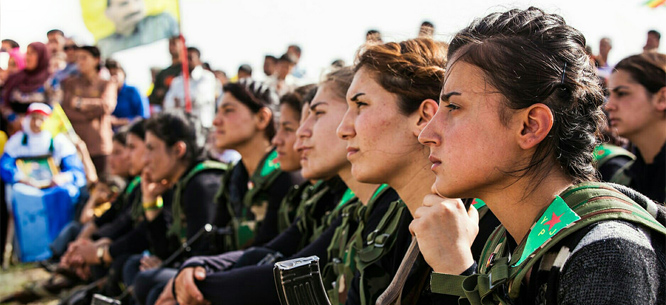

Profound gratitude is due once more to our staunch and heroic allies, the Syrian Kurds of Rojava.
After years of struggle against ISIS — in the course of which the Kurds have suffered the loss of over 11,000 military men and women (in roughly equal number) sacrificing themselves for the cause of freedom — they have earned our admiration anew.
On the night of February 2nd, a valiant American commando team assaulted the house of Abu Ibrahim al-Hashimi al-Qurashi, successor of Abu Bakr al-Baghdadi as the leader of ISIS. Al-Qurashi blew himself up, a significant setback for the terrorist organization and one of the most notable successes of the Biden Administration to date.
Yet this major accomplishment in counter-terrorism also owes a great deal to key intelligence painstakingly collected by the Kurds. As The Washington Post reported:
“….officials said Qurayshi — distinctive because of the leg, which CIA analysts think was amputated after injuries suffered in a 2015 airstrike — was sometimes spotted outside the house, or when taking brief strolls through the olive trees. Word eventually made its way to informants who work for the Syrian Democratic Forces, a mainly Kurdish militia group closely allied to the United States, current and former U.S. officials said. Intensive surveillance began immediately afterward, with Kurdish watchers following the arrivals and departures of armed men who trudged upstairs to meet with Qurayshi.”
Only days before the raid, the Kurds had paid an enormous price for our common struggle against darkness as a resurgent ISIS launched a massive offensive in Hasakah, northeastern Syria, to free some 4,000 terrorists of all nationalities from the al-Sina prison powder keg. Aided by American and British forces, the Kurds retook the prison after a week of intense fighting.
Cynical tyrants like the Assad regime — or its Iranian and Russian enablers — likely would not have bothered with a recapture effort at all. Assuming they had not summarily executed the prisoners already, revisiting the infamous “Hama Rules” applied to Aleppo they simply would have stayed over the horizon and razed the facility to the ground regardless of civilian casualties.
Taking a higher road than butchery has a cost, however. While 400 imprisoned terrorists were killed, so too were dozens of Kurdish-led fighters (with estimates ranging up to over 140) who lost their lives to prevent the Islamic State’s radical and hateful ideology from spreading in the Levant… not to mention from reaching the shores of Europe and America.
Successes like February 2nd happen because the U.S. can count on allies who have our backs. For the tens of thousands dead and wounded suffered by the Kurds, we lost ten armed service members in that war.
Despite such badges of honor — and as recent events remind us all of the pivotal role played by the Kurds in the war against barbarism today and every day — their extraordinary efforts and crucial contribution have settled nothing for the Kurdish cause.
In fact, the Kurds of Rojava are more alone than ever.
They need military and humanitarian aid desperately. They have on their hands not only the 70,000 women and children living at the al-Hawl and Roj refugee camps, but also the thousands of imprisoned foreign terrorists whose repatriation is being denied by their home countries, pressing instead that these criminals be judged at the site of their crimes. But trying them would require decades and a robust court system — a prospect that is simply unrealistic.
At the same time, the Syrian Kurds must face the constant dual threat of Erdogan’s troops on one side and those of Bashar al-Assad on the other. Caught as they are between the malice of Ankara and the viciousness of Damascus, as a callous West looks on…
When, if ever, will the international community do the right thing by these exemplary allies of the free world?
When, if ever, will the Kurdish men and women of Rojava be relieved, defended, and recognized for their unique courage and exceptional loyalty to the West?
We recognize and stand with the Kurds.
Thomas S. Kaplan, Justice for Kurds Chairman
Bernard-Henri Lévy, Justice for Kurds President
